美式英语翻译
translate的名词形式

translate的名词形式translate的名词形式有两个,分别是:translation和translator。
其中translation主要译为:翻译、译文、译本、译作、转变、转化等含义;而translator主要译为:(尤指专职)翻译,译员,译者,翻译家等含义。
【translation】一、读音英式读音:trænzˈleɪʃn]美式读音:trænzˈleɪʃn]二、词性及释义(n.):翻译、译文、译本、译作、转变、转化等含义;三、双语例句例句 1. Poetry always loses something in translation.诗歌一经翻译总会失去某些东西。
例句 2. The exam consists of an essay and an unseen translation.考试包括一篇作文和一篇即席翻译。
例句 3. Most of the translation he did for me was complete nonsense.他给我做的大多数译文完全不知所云。
例句 4. The book loses something in translation.此书在翻译过程中丢失了一些原意。
例句 5. Publishers have commissioned a French translation of the book.出版商已委托人把这本书译成法语。
【translator】一、读音英式读音:[trænzˈleɪtə(r)]美式读音:[trænzˈleɪtər]二、词性及释义(n.):(尤指专职)翻译,译员,译者,翻译家等含义;三、双语例句例句 1. The translator failed to capture the spirit of the original.译者没有体会原文的精神。
常用英式英语与美式英语对照表
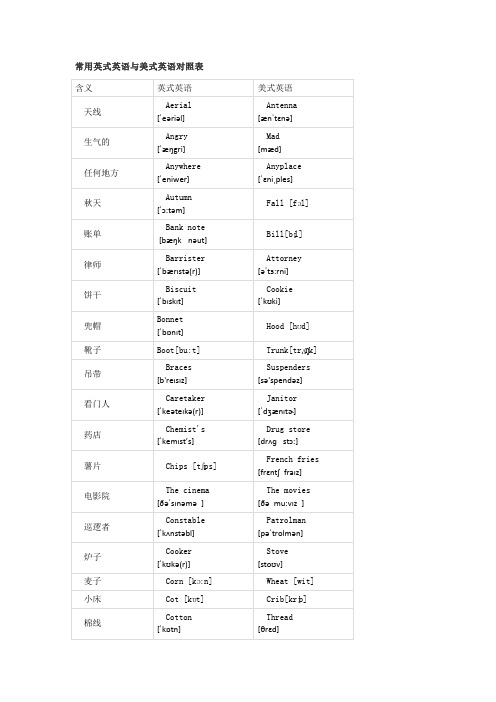
flyover
[ˈflaɪəʊvə(r)]
overpass
[ˈoʊvərpæs]
院子
garden
[ˈgɑ:dn]
yard
[jɑ:rd]
男毕业生
graduate
[ˈgrædʒuət]
alumnus
[əˈlʌmnəs]
烧烤
grill
[grɪl]
boiler
[ˈbɔɪlɚ]
一楼
ground floor
私人医院
nursing home
[ˈnɜ:sɪŋ həum]
private hospital
[ˈpraɪvɪt ˈhɑspɪtl]
酒类商店
Off-lisence
[of ˈlaɪsns]
iquor store
[ˈlɪkɚ stɔr]
人行道
pavement
[ˈpeɪvmənt]
sidewalk
[ˈsaɪdˌwɔk]
[dræfts]
checkers
[ˈtʃekərz]
图钉
drawing pin
[ˈdrɔ:ɪŋ pin]
thumbtack
[ˈθʌmˌtæk]
复式车行道
dual carriageway
[‘dju:əl ˈkærɪdʒweɪ]
divided highway
[dɪˈvaɪdɪd ˈhaɪˌwe]
镇静物
dummy
[bæŋk nəut]
Bill[bɪl]
律师
Barrister
[ˈbærɪstə(r)]
Attorney
[əˈtɜ:rni]
饼干
Biscuit
[ˈbɪskɪt]
家具类翻译专业术语
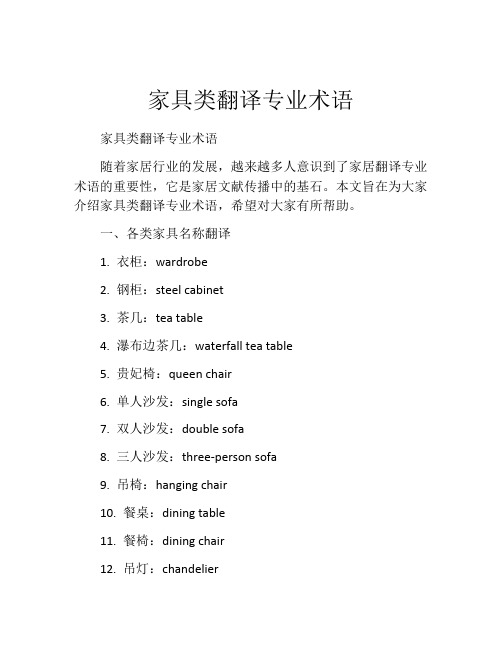
家具类翻译专业术语家具类翻译专业术语随着家居行业的发展,越来越多人意识到了家居翻译专业术语的重要性,它是家居文献传播中的基石。
本文旨在为大家介绍家具类翻译专业术语,希望对大家有所帮助。
一、各类家具名称翻译1. 衣柜:wardrobe2. 钢柜:steel cabinet3. 茶几:tea table4. 瀑布边茶几:waterfall tea table5. 贵妃椅:queen chair6. 单人沙发:single sofa7. 双人沙发:double sofa8. 三人沙发:three-person sofa9. 吊椅:hanging chair10. 餐桌:dining table11. 餐椅:dining chair12. 吊灯:chandelier13. 地灯:floor lamp14. 台灯:desk lamp15. 电视柜:TV cabinet16. 书柜:bookcase17. 餐具柜:crockery cabinet18. 沙发床:sofa bed19. 鞋架:shoe cabinet20. 电脑桌:computer desk二、材料名称翻译1. 实木:solid wood2. PU:PU3. 人造革:artificial leather4. 布艺:fabric5. 仿古青铜:antique bronze6. 亚克力:acrylic7. 玻璃:glass8. 陶瓷:ceramic9. 马赛克:mosaic10. 大理石:marble11. 不锈钢:stainless steel12. 铁艺:iron三、家居用语翻译1. 定制家具:custom-made furniture2. 经典款:classic style3. 现代款:modern style4. 设计师风格:designer style5. 美式风格:American style6. 中式风格:Chinese style7. 欧式风格:European style8. 对称性:symmetry9. 不对称性:asymmetry10. 对比度:contrast11. 韵律:rhythm12. 空间感:sense of space13. 色彩:color14. 纹理:texture15. 材质:material16. 品质:quality17. 易搭配:easy to match18. 细节处理:detail processing19. 工艺处理:process handling20. 合理构造:reasonable structure四、其他常见用语翻译1. 装修:decoration2. 实施方案:implementation plan3. 材料清单:materials list4. 拆除工程:demolition5. 等比缩放:proportional scaling6. 示范区:demonstration area7. 原油价格:crude oil price8. 空气净化器:air purifier9. 洁具:sanitary ware10. 智能家居:smart home总结:以上就是家具类翻译专业术语的一些常见词汇和用语。
English 翻译

English 翻译
English 翻译是:
•adj.英格兰人的;英格兰的;英文的
•n.英语;英格兰人;(台球中的)侧旋
•v.把……译成英语
•n.(美、加、英、澳)英格利希(人名)相关短语
•1、Johnny English
憨豆特工; 憨豆特派员; 特务戆J •2、British English
英国英语; 英式英语; 英式英文; 英语•3、American English
美国英语; 美式英语; 美语; 美式英文双语例句:
1、Her English is almost flawless.
她的英语几乎无可挑剔。
2、I need to improve my English.
我需要提高我的英语水平。
3、He speaks excellent English.
他英语说得棒极了。
4、They speak very precise English.
他们说非常标准的英语。
5、She speaks perfect English.
她讲一口地道的英语。
6、English is my best subject.
英语是我学得最好的一门科目。
7、She spoke English with an accent. 她说英语带有口音。
8、Jackson is a common English name. 杰克逊是常见的英语人名。
9、This is your typical English pub.
这就是典型的英格兰酒吧。
10、He spoke heavily accented English. 他说英语带有浓重的异国口音。
高中英语 轻松阅读 英式英语与美式英语翻译的区别素材
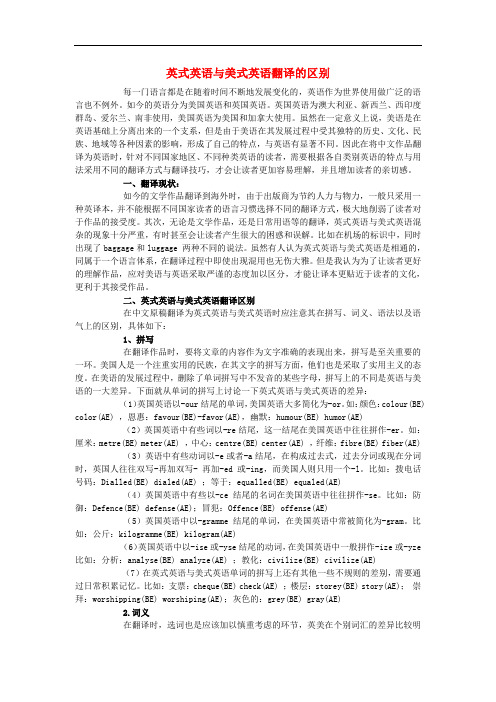
英式英语与美式英语翻译的区别每一门语言都是在随着时间不断地发展变化的,英语作为世界使用做广泛的语言也不例外。
如今的英语分为美国英语和英国英语。
英国英语为澳大利亚、新西兰、西印度群岛、爱尔兰、南非使用,美国英语为美国和加拿大使用。
虽然在一定意义上说,美语是在英语基础上分离出来的一个支系,但是由于美语在其发展过程中受其独特的历史、文化、民族、地域等各种因素的影响,形成了自己的特点,与英语有显著不同。
因此在将中文作品翻译为英语时,针对不同国家地区、不同种类英语的读者,需要根据各自类别英语的特点与用法采用不同的翻译方式与翻译技巧,才会让读者更加容易理解,并且增加读者的亲切感。
一、翻译现状:如今的文学作品翻译到海外时,由于出版商为节约人力与物力,一般只采用一种英译本,并不能根据不同国家读者的语言习惯选择不同的翻译方式,极大地削弱了读者对于作品的接受度。
其次,无论是文学作品,还是日常用语等的翻译,英式英语与美式英语混杂的现象十分严重,有时甚至会让读者产生很大的困惑和误解。
比如在机场的标识中,同时出现了baggage和luggage 两种不同的说法。
虽然有人认为英式英语与美式英语是相通的,同属于一个语言体系,在翻译过程中即使出现混用也无伤大雅。
但是我认为为了让读者更好的理解作品,应对美语与英语采取严谨的态度加以区分,才能让译本更贴近于读者的文化,更利于其接受作品。
二、英式英语与美式英语翻译区别在中文原稿翻译为英式英语与美式英语时应注意其在拼写、词义、语法以及语气上的区别,具体如下:1、拼写在翻译作品时,要将文章的内容作为文字准确的表现出来,拼写是至关重要的一环。
美国人是一个注重实用的民族,在其文字的拼写方面,他们也是采取了实用主义的态度。
在美语的发展过程中,删除了单词拼写中不发音的某些字母,拼写上的不同是英语与美语的一大差异。
下面就从单词的拼写上讨论一下英式英语与美式英语的差异:(1)英国英语以-our结尾的单词,美国英语大多简化为-or。
英式美式英语区别单词举例

英式美式英语区别单词举例英式英语和美式英语是两种主要的英语语言变体,它们在拼写、发音、词汇和语法等方面存在一些差异。
下面是一些英式英语和美式英语之间的区别单词的举例:1. 拼写差异:- 英式英语:colour- 美式英语:color- 英式英语:centre- 美式英语:center- 英式英语:travelling- 美式英语:traveling- 英式英语:analyse- 美式英语:analyze- 英式英语:theatre- 美式英语:theater2. 发音差异:- 英式英语:schedule(发音为/ˈʃɛdjuːl/)- 美式英语:schedule(发音为/ˈskɛdʒul/)- 英式英语:aluminium(发音为/ˌaljʊˈmɪnɪəm/)- 美式英语:aluminum(发音为/əˈlumɪnəm/)- 英式英语:vitamin(发音为/ˈvɪtəmɪn/)- 美式英语:vitamin(发音为/ˈvaɪtəmɪn/)- 英式英语:herb(发音为/hɜːb/)- 美式英语:herb(发音为/ɜːrb/)3. 词汇差异:- 英式英语:lorry(指大型货车)- 美式英语:truck- 英式英语:flat(指公寓)- 美式英语:apartment- 英式英语:biscuit(指饼干)- 美式英语:cookie- 英式英语:boot(指汽车后备箱)- 美式英语:trunk- 英式英语:lift(指电梯)- 美式英语:elevator4. 语法差异:- 英式英语:I have got a car.- 美式英语:I have a car.- 英式英语:Have you got any money?- 美式英语:Do you have any money?- 英式英语:I have just arrived.- 美式英语:I just arrived.- 英式英语:I have been to the cinema.- 美式英语:I went to the movies.- 英式英语:I am going to hospital.- 美式英语:I am going to the hospital.这只是一小部分英式英语和美式英语之间的区别单词的举例。
各种咖啡的中英文对照翻译大全

各种咖啡的中英文对照翻译大全 来源:[本站]浏览:[]1.哥伦比亚咖啡 Colombian Coffee蓝山咖啡 Blue Mou nta in Coffee巴西山度士咖啡 Brazil San tos Coffee拿铁咖啡 Caf e Latt <(Coffee Latte)10.美式咖啡 Caf e America no11.法式滴滤咖啡 French Coffee12.冰法式滴滤 Iced French Coffee13.低因咖啡 Decaffe in ated Coffee2. 牙买加咖啡 Jamaica n Coffee3. 4. 5. 曼特林咖啡 Brazilian Coffee6. 意大利咖啡Italian Coffee7. 意大利浓咖啡 Es presso8. 意大利泡沫咖啡Ca ppuccino9.14. 曼巴咖啡Sp ecial Coffee (Ma ndeli ng and Brazilia n Coffee)15. 速溶咖啡In sta nt Coffee16. 现磨咖啡Fresh Grou nd Coffee17. 冰咖啡Iced Coffee18. 浓缩冰咖啡Iced Esp resso19. 冰薄荷咖啡Iced Mint Coffee20. 冰卡布奇诺Iced Cappuccino21. 冰焦糖卡布奇诺Iced Caramel Capp ucci no22. 冰香草卡布奇诺Iced Van ilia Capp uccino23. 冰榛子卡布奇诺Iced Haze Inut Capp ucc ino24. 果味冰卡布奇诺Iced Fruit Cappuccino25. 果味卡布奇诺Fruit Capp uccino26. 薰衣草卡布奇诺Lave nder Capp ucci no27. 香草卡布奇诺Van ilia Capp uccino28. 榛子卡布奇诺Haze Inut Capp ucci no29.30.3严32.33.34. 35.36.37・38. 39.40.42.43.具擲萍昌再-cedcafeLSe-ced carame-LaH-cedvani_一aLs-ced Haze-nufLa存-cedpineapp-eLaH-cedstrawberryLaH-ced FruifL s B-ackberry Lsvani--a BeanLs ee\e\e\ee e\eJ!擋具昌再擲萍樹漠具昌再擲萍樹漠昌再擲萍LavenderLaXe-ced CoconufLaHe-ced B-ackberryLaH-cedMangoLaHe -ced PeachLaHe PeachLaHe e44. 樱桃咖啡拿铁Cherry Latt e45. 樱桃冰咖啡拿铁Iced Cherry Latt e46. 榛子咖啡拿铁Haze In ut Latt e47. 香蕉咖啡拿铁Banana Latt e48. 浓缩咖啡康保蓝Esp resso Con Panna49. 浓缩咖啡玛奇朵Esp resso Macchiato50. 冰美式咖啡Iced Caf eAmerica no51. 菠萝冰美式Iced Pineapple America no52. 芒果冰美式咖啡Iced Ma ngo America no53. 蜜桃冰美式咖啡Iced P each America no54. 香蕉冰美式Iced Banana America no55. 冰摩卡Iced Mochaccino56. 草莓摩卡咖啡Iced Strawberry Mocha57. 樱桃摩卡咖啡Cherry Mocha58. 椰子摩卡咖啡Coc onut Mocha59. 芒果摩卡咖啡Mango Mocha60. 香蕉摩卡咖啡Banana Mocha61. 冰水果咖啡Iced Fruit Coffee62. 法国香草咖啡French Van ilia Coffee63. 漂浮冰咖啡Iced Coffee Float64. 巧克力冰咖啡Iced Chocolate Coffee65. 巧克力咖啡Chocolate Coffee66. 塔拉珠高山咖啡Tarrazu Coffee67. 碳烧咖啡Charcoal Coffee68. 特雷里奥咖啡Tres Rios Coffee69. 维也纳咖啡Vie nna Coffee70. 杏香咖啡Saro nno Coffee71. 夏威夷可娜咖啡Hawaiia n Kona Coffee72. 玫瑰夫人咖啡Rose Lady Coffee73. 墨西哥冰咖啡Iced Mexica n Coffee74. 瑞士冰咖啡Iced Swiss Coffee75. 巴西咖啡Brazil Coffee76. 皇家咖啡Royal Coffee77. 君度咖啡Coin treau Coffee78. 爱尔咖啡Irish Coffee79. 生姜咖啡Gin ger Juice Coffee80. 贵妇人咖啡Dame Coffee81. 椰香咖啡Coco nut Coffee 本文地址:htt p: //www.8hello.c n/w_show/2/w_show-1057.html。
美式英式英语典型单词
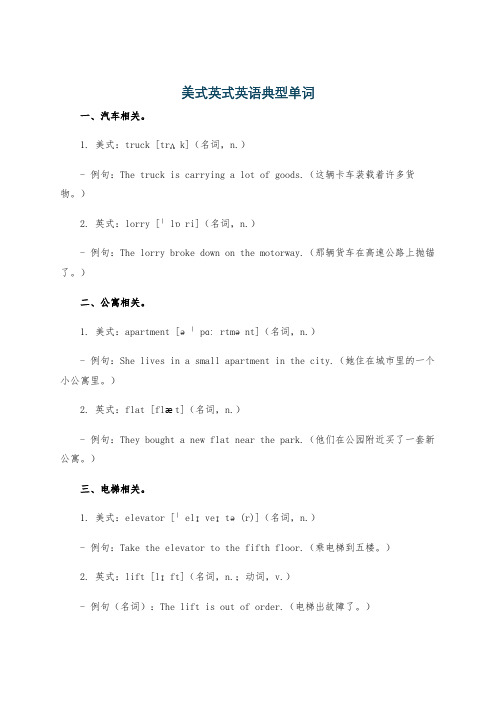
美式英式英语典型单词一、汽车相关。
1. 美式:truck [trʌk](名词,n.)- 例句:The truck is carrying a lot of goods.(这辆卡车装载着许多货物。
)2. 英式:lorry [ˈlɒri](名词,n.)- 例句:The lorry broke down on the motorway.(那辆货车在高速公路上抛锚了。
)二、公寓相关。
1. 美式:apartment [əˈpɑːrtmənt](名词,n.)- 例句:She lives in a small apartment in the city.(她住在城市里的一个小公寓里。
)2. 英式:flat [flæt](名词,n.)- 例句:They bought a new flat near the park.(他们在公园附近买了一套新公寓。
)三、电梯相关。
1. 美式:elevator [ˈelɪveɪtə(r)](名词,n.)- 例句:Take the elevator to the fifth floor.(乘电梯到五楼。
)2. 英式:lift [lɪft](名词,n.;动词,v.)- 例句(名词):The lift is out of order.(电梯出故障了。
)- 例句(动词):Can you lift this heavy box?(你能抬起这个重箱子吗?)四、秋季相关。
1. 美式:fall [fɔːl](名词,n.;动词,v.)- 例句(名词):I love the colors of fall.(我喜欢秋天的颜色。
)- 例句(动词):Leaves fall from the trees in autumn.(秋天树叶从树上落下。
)2. 英式:autumn [ˈɔːtəm](名词,n.)- 例句:Autumn is a beautiful season.(秋天是一个美丽的季节。
)五、地铁相关。
英式英语与美式英语翻译的区别
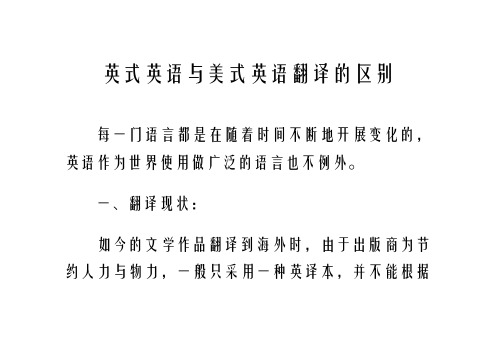
英式英语与美式英语翻译的区别每一门语言都是在随着时间不断地开展变化的,英语作为世界使用做广泛的语言也不例外。
一、翻译现状:如今的文学作品翻译到海外时,由于出版商为节约人力与物力,一般只采用一种英译本,并不能根据.不同国家读者的语言习惯选择不同的翻译方式,极削弱了读者对于作品的承受度。
其次,无论是文学作品,还是日常用语等的翻译,英式英语与美式英语混杂的现象十分严重,有时甚至会让读者产生很大的困惑和误解。
比方在机场的标识中,同时出现了baggage和luggage两种不同的说法。
虽然有人认为英式英语与美式英语是相通的,同属于一个语言体系,在翻译过程中即使出现混用也无伤大雅。
但是我认为为了让读者更好的理解作品,应对美语与英语采取严谨的态度加..以区分,才能让译本更贴近于读者的文化,更利于其承受作品。
二、英式英语与美式英语翻译区别在中文原稿翻译为英式英语与美式英语时应注意其在拼写、词义、语法以及语气上的区别,具体如下:1、拼写. .word.zl..在翻译作品时,要将文章的容作为文字准确的表现出来,拼写是至关重要的一环。
美国人是一个注重实用的民族,在其文字的拼写方面,他们也是采取了实用主义的态度。
在美语的开展过程中,删除了单词拼写中不发音的某些字母,拼写上的不同是英语与美语的一大差异。
下面就从单词的拼写上讨论一下英式英语与美式英语的差异:〔1〕英国英语以-our结尾的单词,美国英语大多..简化为-or。
如:颜色:colour(BE)color(AE),恩惠:favour(BE)-favor(AE),幽默:humour(BE)humor(AE)〔2〕英国英语中有些词以-re结尾,这一结尾在美国英语中往往拼作-er。
如:厘米:metre(BE)meter(AE),中心:centre(BE)(AE),纤维:fibre(BE)fiber(AE)〔3〕英语中有些动词以-e或者-a结尾,在构成过去式,过去分词或现在分词时,英国人往往双写-再. .word.zl..加双写-再加-ed或-ing,而美国人那么只用一个-l。
person 翻译

person的英文读法如下:
person的英式发音为[ˈpɜːs(ə)n];美式发音为[ˈpɜːrs(ə)n]。
person的中文释义:
1、当词性为名词时,意为人;人们;自然人,法人;(用于不知其人是谁时)某人,家伙;(语法)人称;(用于复合词)从事……工作(或担任……职务)的人。
人品,为人;身体,人身;喜爱(某事物)的人;(戏剧或故事中的)人物,角色;(基督教神学)(圣父、圣子、圣灵三位一体的)位;容貌,外表。
2、当用作人名时,可翻译为(Person)(法、俄、德、瑞典)佩尔松,(英)珀森。
短语搭配:
1、in person亲自。
2、business person商人。
3、famous person名人;知名人士;有名的人。
4、average person普通人。
5、per person每人;人均;每个人。
双语例句:
1、He was a very sensual person. 他是个非常喜爱感官享受的人。
2、No sane person would do that. 没有一个神志正常的人会做那样的事。
3、What is she like as a person? 她的人品怎么样?
4、She's quite a chatty person.
她是个颇爱聊天的人。
5、He's quite a serious person.
他是一个相当严肃的人。
各种咖啡的英语翻译

各种咖啡的英语翻译Bananalatte香蕉拿铁咖啡fruitcappuccino果味卡布奇诺Bananamocha香蕉摩卡咖啡gingerjuicecoffee生姜咖啡Blackberrylatte黑莓拿铁咖啡Hawaiiankonacoffee夏威夷可娜咖啡Bluemountaincoffee蓝山咖啡hazelnutcappuccino榛子卡布奇诺Brazilcoffee巴西咖啡hazelnutlatte榛子拿铁BrazilSantoscoffee巴西山度士咖啡Braziliancoffee曼特林咖啡Cafélatte(coffeelatte)拿铁Cappuccino意大利泡沫咖啡Charcoalcoffee炭烧咖啡Cherrylatte樱桃拿铁Cherrymocha樱桃摩卡咖啡Chocolatecoffee巧克力咖啡Coconutcoffee椰香咖啡Coconutmocha椰子摩卡咖啡Cointreaucoffee君度咖啡Colombiancoffee哥伦比亚咖啡Damecoffee贵妇人咖啡Decaffeinatedcoffee低因咖啡Espressoconpanna浓缩咖啡康保蓝Espressomacchiato浓缩咖啡马克奇朵Espresso意大利浓缩咖啡Frenchcoffee法式滴滤咖啡Frenchvanillacoffee法国香草咖啡Freshgroundcoffee现磨咖啡Jamaicancoffee牙买加咖啡Lavendercappuccino薰衣草卡布奇诺Mangomocha芒果摩卡Peachlatte蜜桃拿铁Roseladycoffee玫瑰夫人咖啡Royalcoffee皇家咖啡Specialcoffee(MandelingandBrazilian Coffee)曼巴咖啡Strawberrymocha草莓摩卡咖啡Tresrioscoffee特雷里奥咖啡Vanillabeanlatte拿铁香草Vianillacappuccino香草卡布奇诺Viennacoffee维也纳咖啡icedbananaAmericano香蕉冰美式咖啡icedblackberrylatte黑莓冰拿铁icedcaféAmericano冰美式咖啡icedcafélatte冰拿铁icedcappuccino冰卡布奇诺icedcaramelcappuccino冰焦糖卡布奇诺icedcherrylatte樱桃冰拿铁icedchocolatecoffee巧克力冰咖啡icedcoconutlatte椰子冰拿铁icedcoffeefloat漂浮冰咖啡icedcoffee冰咖啡icedespresso浓缩冰咖啡icedFrenchcoffee冰法式滴滤icedfruitcappuccino果味冰卡布奇诺icedfruitcoffee冰水果咖啡icedhazelnutcappuccino冰榛子卡布奇诺icedhazelnutlatte冰榛子拿铁icedmangoAmericano冰芒果美式咖啡icedmangolatte冰芒果拿铁icedMexicancoffee墨西哥冰咖啡icedmintcoffee冰薄荷咖啡icedmochaccino冰摩卡icedpeachAmericano蜜桃冰美式咖啡icedpineapplelatte冰菠萝拿铁icedstrawberrylatte冰草莓拿铁icedSwisscoffee瑞士冰咖啡icedvanillalatte冰香草拿铁icedvanillacappuccino冰香草卡布奇诺instantcoffee速溶咖啡Irishcoffee爱尔兰咖啡Italiancoffee意大利咖啡。
英式英语与美式英语翻译的区别

英式英语与美式英语翻译的区别每一门语言都是在随着时间不断地发展变化的,英语作为世界使用做广泛的语言也不例外。
一、翻译现状:如今的文学作品翻译到海外时,由于出版商为节约人力与物力,一般只采用一种英译本,并不能根据不同国家读者的语言习惯选择不同的翻译方式,极大地削弱了读者对于作品的接受度。
其次,无论是文学作品,还是日常用语等的翻译,英式英语与美式英语混杂的现象十分严重,有时甚至会让读者产生很大的困惑和误解。
比如在机场的标识中,同时出现了baggage和lug gage两种不同的说法。
虽然有人认为英式英语与美式英语是相通的,同属于一个语言体系,在翻译过程中即使出现混用也无伤大雅。
但是我认为为了让读者更好的理解作品,应对美语与英语采取严谨的态度加以区分,才能让译本更贴近于读者的文化,更利于其接受作品。
二、英式英语与美式英语翻译区别在中文原稿翻译为英式英语与美式英语时应注意其在拼写、词义、语法以及语气上的区别,具体如下:1、拼写在翻译作品时,要将文章的内容作为文字准确的表现出来,拼写是至关重要的一环。
美国人是一个注重实用的民族,在其文字的拼写方面,他们也是采取了实用主义的态度。
在美语的发展过程中,删除了单词拼写中不发音的某些字母,拼写上的不同是英语与美语的一大差异。
下面就从单词的拼写上讨论一下英式英语与美式英语的差异:(1)英国英语以-o ur结尾的单词,美国英语大多简化为-or。
如:颜色:colour(BE)color(AE),恩惠:favour(BE)-favor(AE),幽默:humour(BE)humor(A E)(2)英国英语中有些词以-re结尾,这一结尾在美国英语中往往拼作-er。
如:厘米:metre(BE)meter (A E),中心:centre(BE)(AE),纤维:fibre(BE)fiber (A E)(3)英语中有些动词以-e或者-a结尾,在构成过去式,过去分词或现在分词时,英国人往往双写-再加双写-再加-ed或-ing,而美国人则只用一个-l。
美式英语英式英语常用单词对照表
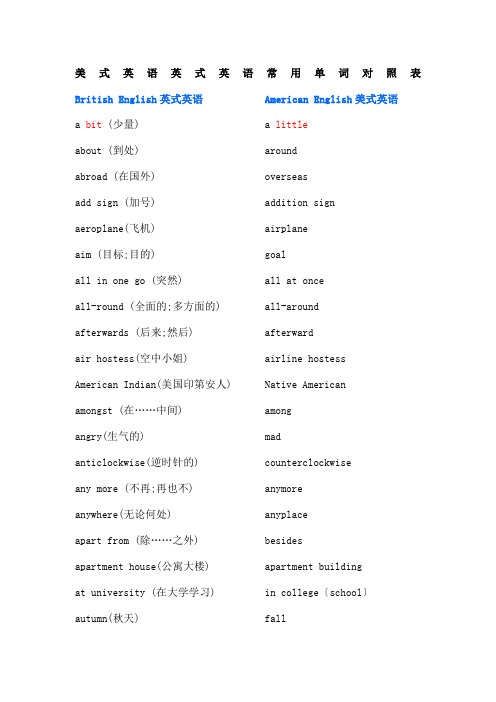
美式英语英式英语常用单词对照表British English英式英语American English美式英语a bit (少量) a littleabout (到处)aroundabroad (在国外)overseasadd sign (加号)addition signaeroplane(飞机)airplaneaim (目标;目的)goalall in one go (突然)all at onceall-round (全面的;多方面的)all-aroundafterwards (后来;然后)afterwardair hostess(空中小姐)airline hostessAmerican Indian(美国印第安人)Native Americanamongst (在……中间)amongangry(生气的)madanticlockwise(逆时针的)counterclockwiseany more (不再;再也不)anymoreanywhere(无论何处)anyplaceapart from (除……之外)besidesapartment house(公寓大楼)apartment buildingat university (在大学学习)in college〔school〕autumn(秋天)fallaxe(斧头)axbackwards (向后)backwardbackwards and forwards (来回地)back and forthbad-tempered (脾气暴躁的)grumpybandage(绷带)gauzebank note(钞票)billbarber's shop(理发店)barbershopbarman(酒吧招待)bartenderbeauty parlour(美容院)beauty shop〔beauty salon〕beckon (示意)signalbe made up of (由……组成)be made ofbank note (纸币)billbill (账单)checkbilliard room(台球室)poolroom〔pool hall〕billion(万亿)trillionbin (废纸篓)wastebasketbiscuit(饼干)cookie〔cracker〕blackboard(黑板)chalkboardbook(预订)reservebooking office(售票处)ticket officebookshop(书店)bookstoreboots〔wellies〕 (雨靴)galoshesbottom drawer (嫁妆)hope chestbraces(吊带;背带)suspendersbrackets (括号)parenthesesbreak(课间休息;学校假期)recessbricks (积木)blocksbridesmaid(伴娘)maid of honorbum (屁股)fannybyway (小路)back roadcab rank(出租车停车处)taxi standcalendar (一览表)cataloguecall box(公用电话亭)phone boothcall in to (顺便逛)go〔run〕 bycamp bed(行军床)cotcamp fire (篝火;营火)campfirecandy stick (甘蔗)candy canecarat(克拉,宝石的重量单位)karatcaretaker〔porter〕 (门房;看门人)janitorcarriage(车厢)carcar park(停车场)parking lotcashier(出纳员)tellercontent (目录)cataloguecentral reservation(安全岛)median strip〔divider〕certainly(当然)surechairman (主席;会长;董事长等)presidentchartered accountant(注册会计师)certified public accountant chat show(访谈节目)talk showcheap (廉价的)inexpensivecheeky (无耻的)nervychemist(药剂师)druggistchemist's shop(药店)drugstore〔pharmacy〕cheque(支票)checkChristian name(名字)given namechoosy(好挑剔的)pickycinema(电影院)movieclamber (攀登;爬)scrambleclassified ad(分类广告)want adclimbing-frame(攀缘架)jungle gymclingfilm (保鲜膜)plastic wrapclothes-peg (晾衣用的衣夹)clothespincock(公鸡)roostercode number (电话区号)area numbercoffin(棺材)casketcomic(漫画书)comic bookcommercial traveller(旅行推销员)traveling salesmanconcertina (手风琴)accordioncooker (炉具)stoveco-operate (合作)cooperateco-ordinate (协调)coordinatecopper〔bobby〕 (警察)copcosy(舒适的)cozycot(婴儿床)cribcounty town(县城)county seatcrisps(炸薯片)chipscross (生气的)angrycrossroad(十字路口)intersection〔junction〕cul-de-sac(死胡同)dead-endcupboard(碗柜)closetcurrent account(活期存款账户)checking account curriculum vitae〔c.v.〕 (简历;履历)r esumecurtains(窗帘)drapescutting(剪报)clippingexpensive (昂贵的)deardeposit account(储蓄存款账户)savings account despatch (派遣;发送)dispatchdialling code(区号)area codedialling tone(拨号音)dial tonedinner jacket(小礼服)tuxedodisc(圆盘;唱片)diskdish(碟)platedishonour (丢脸;不光彩)disgracedistance learning course (函授课程)c orrespondence coursediversion(绕路)detourdivision(区)districtdrainpipe (排水管)downspoutdraper's shop(纺织品店)dry-goods storedrapery(纺织品)dry goodsdraught (散装啤酒)draftdraughts (国际跳棋)checkersdrawing pin (图钉)pushpindriving-licence(驾驶执照)driver's licensedual carriageway(双行道)divided highwaydustbin〔rubbish bin〕(垃圾箱)garbage can〔ashcan,trash can〕dust cart(垃圾车)garbage truckgarbage collector〔sanitation dustman(清洁工)worker〕dyke (排水沟)dikedynamo (发电机)generatorear ache (耳痛)earacheearth wire(地线)ground wireelastic band(松紧带;橡皮筋)rubber bandengine(发动机)motormoving staircase〔moving escalator(电梯)stairway〕estate agent(房地产经纪人)realtorestate car(旅行轿车)station wagoneverywhere(到处)everyplaceexclamation mark(感叹号)exclamation pointexhaust pipe(排气管)tailpipeexhaust silencer (消音器)mufflerexpress delivery post(特快专递)special delivery mailex-serviceman(退伍老兵)veteranextra time (加班时间)overtimefacecloth〔face-flannel〕(洗脸毛巾)w ashclothfall ill (生病)get sickfall over (跌倒)fall downFather Christmas(圣诞老人)Santa Clausfete (汇演;庆祝活动)festivalfilm(电影)moviefilm star(电影明星)movie starfind (发现)discoverfire brigade(消防队)fire department firework(烟火)firecrackerfirstly (首先)firstfirst floor(第二层)second floor fishmonger's(鱼店)fish store flashlight (摄影闪光灯)flashbulbflask(暖瓶)thermosflat(公寓)apartmentflat battery (废电池)dead batteryflat-out(以最高速)all-outflex(电线)electric wire flick knife(弹簧刀)switchblade knife flick through (浏览;快速翻动)leaf throughflight ticket (飞机票)plane ticket flipper(鳍)finflyover(立交桥)overpassfog lamp (汽车的雾灯)fog lightfootball(足球)soccerfootpath〔pavement〕(人行道)sidewalk forename(名)given namefor ever (永远)foreverfork-lift (铲车;叉车)forkliftFrench window(落地长窗)French doorsfridge(电冰箱)refrigerator〔icebox〕fridge-freezer(电冰箱)refrigerator-freezer friendly society(互助会)fraternal society fringe(刘海)bangsfrontier (边境;边界)borderfruit machine(吃角子老虎)slot machinefull stop(句号)periodfuneral parlour(殡仪馆)funeral homefun fair(游乐园)amusement parkfunnel(烟窗)smokestackfurther education(成人教育)adult education gangway (过道;狭长通道)aislegaol(监狱)jailgaolbird(囚犯)jailbirdgaoler(监狱看守)jailergarage〔petrol〕 station (加油站)gas stationgarden party(游园会)lawn partygearbox(变速箱)transmissiongearing(传动装置)leveragegear lever (变速杆)gear liftgents〔gent's〕(男厕)men's roomget on with someone(相处融洽)get along with someone get the sack (被解雇)be dismissed〔fired〕girl guide(女童军)girl scoutglasses(眼镜)eyeglassesglowworm(萤火虫)lightning buggoods lift(公务电梯)freight elevator goods train(货运车)freight traingoose pimples(鸡皮疙瘩)goose bumpsgo-slow(减速)slowdowngraduate(大学毕业生)alumnusgramophone(留声机)phonographgreaseproof paper(蜡纸)wax papergrey(灰色的)graygrocer's(杂货店)grocery storeground floor(第一层)first floorgroundnut(花生)peanutconductor(售票员)guardguildhall(市政厅)city hallgumboots(橡胶高筒靴)rubbersgundog(猎犬)bird doggym shoe(运动鞋)sneakerhand lens (放大镜)magnifying glasshairdresser (理发师)hair stylisthalf-time (中场休息)halftimehalf-way (中途;半路上)halfwayhallo〔hullo〕 (喂;嘿;哎)hellohall of residence(学校公寓)dormitoryhandbag(手提包)purse〔pocketbook〕hang about (无聊地空等)wait aroundhave a go (尝试)take a turn〔give something a try〕have a lie-in (睡懒觉)sleep inhave an early night (早早就寝)go to bed earlyheadlamp (车前灯)headlighthigh street(大街;主要街道)main streethire car (租用汽车)rental carhomelike(亲切的)homeyholiday(假期)vacationholidaymaker(度假者)vacationerhomework(家庭作业)assignmenthomosexual (同性恋者)faghood (车顶;引擎罩)roofhooter (汽笛)horn〔siren〕hotchpotch (大杂烩)hodgepodgeice lolly(冰棍)popsicleill〔unwell〕(有病的)sickindustrial estate(工业区)industrial park infrared (红外线的)infra-redin future (今后;从今以后)in the future inland revenue(国内税收)internal revenue inquiry agent(私人侦探)private detective interval(幕间休息;时间间隔)intermission inverted commas(引号)quotation marks invigilate(监考)proctorjam(果酱)jellyjersey〔jumper〕(运动衫)sweaterjoint-stock company(股份公司)stock company journalist(新闻记者)newsmanjug(大水罐)pitcherjump a red light (闯红灯)run a red light jump the queue (插队)cut in line junction(十字路口)intersection keen (渴望的)avid〔eager〕kerb(路边石)curbkennel (狗窝)doghousekiosk(报刊亭)newsstandkitchen paper (纸巾)paper towelknockout (淘汰赛)practice sessionlabel (标签)taglace (鞋带)shoelaceladies(女厕)ladies' roomlast but one(倒数第二)next to lastlastly (最后)lastleader〔leading〕 article(社论)editorialleft-luggage office(行李房)baggage room〔check room〕leisure centre (体育活动中心)sports complexleisure park (游乐场)amusement parklet(出租;租赁)lease〔rent〕letter box(信箱)mail slotlife belt(安全带)life preserverlife saver(救生员)lifeguardlift(电梯)elevatorlightning conductor(避雷针)lightning rodlimited liability company(有corporation限责任公司)litterbin(废物箱)litterbaglittle finger(小指)pinkielodging house(公寓)rooming houseloft (阁楼)atticlodging (寄住宿舍)rented roomlollipop(棒棒糖)lolly〔sucker〕longsighted(远视的)farsightedloo(厕所)johnlook after (照料;照顾)take care oflook in on (顺便拜访)drop bylook-out (岗哨)lookoutlook over (检查;查看)look atlorry(载重卡车)trucklost property office (失物招lost and found department 领处)lots of (许多) a lot oflounge suit(西装)business suitluggage(行李)baggageluggage van(行李车)baggage carmackintosh〔mac〕(雨衣)raincoatmad(疯狂的)crazymain road(公路;干线)highwaymaize(玉米)(Indian) cornmake-up (化妆;补考)makeupmarching orders(逐客令;免职通walking papers知)mark (防守;盯住)guardmark (分数)pointmarriage lines(结婚证书)marriage certificatemarrow (西葫芦)squashmash(土豆泥)mashed potatoesmatch(比赛)gamemaths(数学)mathmatron (护士长)senior nursemean(卑鄙的)stingymeat pie(肉馅饼)potpiemegaphone(扩音器)bullhornmend (修理)fixmiaow(猫叫)meowmilliard(十亿)billionmind (密切注意;戒备)watch〔watch out for〕miss a go (错过一次机会)lose〔miss〕 a turnmiss out (忽略;不包括)leave outmonkey nut (花生)peanutmotion-picture(电影)moviemotorcar(汽车)automobile〔auto〕thruwaymotorway(高速公路)〔expressway,freeway,superhighway〕moustache (八字胡)mustachemouth organ(口琴)harmonica mudguard(挡泥板)fendermusical box (八音盒)music box multiple shop(连锁店)chain store mum(妈妈)mom〔ma〕nail varnish(指甲油)nail polish napkin〔nappy〕(尿布)diapernasty(下流的;肮脏的)meannational service (兵役)military service near by (在附近)nearby newsagent〔bookstall〕(书摊)newsstandnews cutting (新闻剪辑)news clipping nib(笔尖)pen point nightdress〔nightie〕(女睡衣)n ightgownnon-stop (直达的)nonstopnormal (普通的;正常的)standardnote(账单;票据)billnote pad(便签簿)scratchpad notice board(布告牌)bulletin board nought(零)zeronowadays〔these days〕 (现在)t odaynowhere(无处)noplacenumber plate(车号牌)license platenursing home(疗养院)private hospitaloffice block (办公大楼)office buildingoff-license(白酒店)liquor storeoutdoor toilet(户外厕所)outhouseouthouse(外屋,指车库、谷仓等)o utbuildingovertake(超车)passpacket(小包;盒子)packpale ale(浅色汽水)light alepancake-roll(蛋卷)egg rollpanda car(巡逻警车)paddy wagonpants(短裤)shortspaper carrier (纸袋)paper bagpaper handkerchief (纸巾)tissueparcel(包裹)packagepassage〔passageway〕(通道)hall〔hallway〕past (过……)afterpay packet(工资袋)paycheck〔pay envelope〕pedestrian crossing(人行横道)c rosswalkpedlar(流动小贩)peddlerpen-friend(笔友)pen palpeep(窥视;偷看)peekpenknife (小折刀)pocketknifeper cent (百分比)percentpetrol(汽油)gas〔gasoline〕petrol station(加油站)gas〔filling,service〕 station pickaxe(镐)pickpictures(电影)moviespig(猪)hogplait(辫子)braidplaysuit(运动装)jump suitplough(犁)plowpost(邮递;邮件)mailpostal code〔postcode〕(邮政zip code编码)postal van(邮车)mail carpostbox(邮箱)mailboxpostgraduate(研究生)graduatepostman(邮递员)mailman〔mail carrier〕potato crisps(土豆片)potato chipspower point (电源插座)outlet〔socket〕power station(电厂;发电站)power plantprefect(班长)monitorpresenter (主持人)hostpresently(不久)soonprimary school(小学)grade schoolpub(酒馆)barpublic convenience(公共厕所)public toilet〔comfort station〕public school(公立学校)private schoolpurse〔wallet〕 (钱夹)billfoldput through (接通电话)connectpyjamas(睡衣)pajamasquay (码头)dockqueue(行;列;排)linequite〔rather,very〕 (很;相当;pretty非常)racecourse(赛马场)racetrackrailway(铁道)railroadrailway engine(火车头)locomotiverailway station(火车站)train stationrapids(急流)white waterrear〔bring up〕 (养育)raiserear-view mirror (后视镜)rearview mirrorreckon (假定;认为)figurerecord player(电唱机)phonographrecreation ground(操场)playgroundredcap(宪兵)military policeman restaurant car(餐车)dining car〔diner〕return trip(来回程)round tripreversing light (倒车灯)back-up lightrevise (复习)reviewring off (挂断电话)hang upring road(环行路)beltwayrocking chair(摇椅)rockerroundabout (旋转木马)merry-go-round〔carousel〕rubber(橡皮)eraserrubbish(垃圾)trashrucksack (背包)backpackrugby(橄榄球)footballrun riot (撒野;闹事)run wildsack(解雇)firesafety belt (安全带)seat beltsaloon(轿车)sedansalutation(致意)greetingsarnie(三明治)sandwichsea (海洋)oceanseason ticket(月票)commuter ticketseason-ticket holder(上班族)commutersecondary〔middle〕 school(中high school学)seesaw(秋千)teeter-totterset square (三角板)triangleshareholder(股民)stockholdershare out (分发)distributeshares(股份)stockshivery (颤抖的)shiveringshoelace(鞋带)shoestringshop(商店)storeshop assistant(店员)salesclerk〔store clerk〕shopkeeper(店主)storekeepershopping centre(大型购物中心)s hopping mallshopwalker(商店巡视员)floor walkershortsighted(近视的)nearsightedsick(恶心的)nauseoussingle ticket(单程票)one-way ticketsinglet(汗衫)undershirtsitting room(起居室)front roomskipping rope(跳绳)jump ropesledge(雪橇)sledsleeper(枕木)railroad tie smack (掌击;掴)slapsmart (穿着讲究的)well-dressed somewhere(某处)someplacesort (种类)kindspeciality (专业;特长)specialtystaff (大学的全体教员)facultystandard lamp(落地灯)floor lampstave (五线谱)staffstorey (楼层)storystreetlight(街灯)streetlamp subeditor(助理编辑;文字编辑)copy editor subway(地下道)underpasssum (算术题)math problem supply teacher(代课老师)substitute teacher sweet(糖果)dessertsweetshop(糖果烟杂店)candy storeswop (交换)swaptake up (吸收)absorbtap(龙头)faucettax-free(免税的)tax-exempttea-towel(擦碟干布)dishtoweltell off (责骂)scoldtelly(电视)television〔television set,TV〕term (学期)semestertidy (整齐的)neattights(女用连裤袜)pantyhosetimber(木料)lumbertimetable(时间表)scheduletin(罐头)cantitbit (趣闻;轶闻)tidbittoffee〔toffy〕(太妃糖)taffytoll road(收费公路)turnpiketorch(手电筒)flashlighttown hall(市政厅)city halltrade union(工会)labor uniontraffic island(交通岛)safety islandtraffic light(红绿灯)stoplighttram〔tramcar〕(有轨电车)streetcar〔trolley〕trousers(裤子;长裤)pants〔slacks〕truncheon (警棍)nightsticktrunk call(长途电话)long-distance telephone call tube(地铁)subwaytyre(轮胎)tireunderground(地铁)subway underpants(内衣裤)shortsupside-down (上下颠倒的)upside down veranda(阳台;走廊)porchvest(背心;马甲)undershirtwages clerk (在职职员)payroll clerk waggle (来回摇动)wigglewander about (闲逛;游荡)wander around warder (监狱看守)guardwashbasin(脸盆)sinkwashing line (晾衣绳)clothesline washing powder (洗衣粉)laundry detergent way in (入口)entranceway out (出口)exitwee (撒尿)peewhore(娼妓)hookerwild flower (野花)wildflower windscreen(风挡;挡风玻璃)windshield window sill (窗台)windowsillwing (挡泥板)fenderwireless(无线电;收音机)radiowitness-box(证人席)witness standwork out something (计算;算出)f igure something out works(工厂)factory〔plant〕yoghurt (酸奶)yogurtzebra crossing (人行道)crosswalkzip(拉锁;拉链)zipperzoo-keeper (动物管理员)zookeeper。
美式英语英式英语常用单词对照表

美式英语英式英语常用单词对照表British English英式英语American English美式英语a bit (少量) a littleabout (到处) aroundabroad (在国外) overseasadd sign (加号) addition signaeroplane(飞机) airplaneaim (目标;目的) goalall in one go (突然) all at onceall-round (全面的;多方面的) all-aroundafterwards (后来;然后) afterwardair hostess(空中小姐) airline hostessAmerican Indian(美国印第安人) Native Americanamongst (在……中间) amongangry(生气的) madanticlockwise(逆时针的) counterclockwiseany more (不再;再也不) anymoreanywhere(无论何处) anyplaceapart from (除……之外) besidesapartment house(公寓大楼) apartment buildingat university (在大学学习) in college〔school〕autumn(秋天) fallaxe(斧头) axbackwards (向后) backwardbackwards and forwards (来回地) back and forthbad-tempered (脾气暴躁的) grumpybandage(绷带) gauzebank note(钞票) billbarber's shop(理发店) barbershopbarman(酒吧招待) bartenderbeauty parlour(美容院) beauty shop〔beauty salon〕beckon (示意) signalbe made up of (由……组成) be made ofbank note (纸币) billbill (账单) checkbilliard room(台球室) poolroom〔pool hall〕billion(万亿) trillionbin (废纸篓) wastebasketbiscuit(饼干) cookie〔cracker〕blackboard(黑板) chalkboardbook(预订) reservebooking office(售票处) ticket officebookshop(书店) bookstoreboots〔wellies〕 (雨靴) galoshesbottom drawer (嫁妆) hope chestbraces(吊带;背带) suspendersbrackets (括号) parenthesesbreak(课间休息;学校假期) recessbricks (积木) blocksbridesmaid(伴娘) maid of honorbum (屁股) fannybyway (小路) back roadcab rank(出租车停车处) taxi standcalendar (一览表) cataloguecall box(公用电话亭) phone boothcall in to (顺便逛) go〔run〕 bycamp bed(行军床) cotcamp fire (篝火;营火) campfirecandy stick (甘蔗) candy canecarat(克拉,宝石的重量单位) karatcaretaker〔porter〕 (门房;看门人) janitorcarriage(车厢) carcar park(停车场) parking lotcashier(出纳员) tellercontent (目录) cataloguecentral reservation(安全岛) median strip〔divider〕certainly(当然) surechairman (主席;会长;董事长等) presidentchartered accountant(注册会计师) certified public accountant chat show(访谈节目) talk showcheap (廉价的) inexpensivecheeky (无耻的) nervychemist(药剂师) druggistchemist's shop(药店) drugstore〔pharmacy〕cheque(支票) checkChristian name(名字) given namechoosy(好挑剔的) pickycinema(电影院) movieclamber (攀登;爬) scrambleclassified ad(分类广告) want adclimbing-frame(攀缘架) jungle gymclingfilm (保鲜膜) plastic wrapclothes-peg (晾衣用的衣夹) clothespincock(公鸡) roostercode number (电话区号) area numbercoffin(棺材) casketcomic(漫画书) comic bookcommercial traveller(旅行推销员) traveling salesmanconcertina (手风琴) accordioncooker (炉具) stoveco-operate (合作) cooperateco-ordinate (协调) coordinatecopper〔bobby〕 (警察) copcosy(舒适的) cozycot(婴儿床) cribcounty town(县城) county seatcrisps(炸薯片) chipscross (生气的) angrycrossroad(十字路口) intersection〔junction〕cul-de-sac(死胡同) dead-endcupboard(碗柜) closetcurrent account(活期存款账户) checking accountcurriculum vitae〔c.v.〕 (简历;履历) resumecurtains(窗帘) drapescutting(剪报) clippingexpensive (昂贵的) deardeposit account(储蓄存款账户) savings accountdespatch (派遣;发送) dispatchdialling code(区号) area codedialling tone(拨号音) dial tonedinner jacket(小礼服) tuxedodisc(圆盘;唱片) diskdish(碟) platedishonour (丢脸;不光彩) disgracedistance learning course (函授课程) correspondence coursediversion(绕路) detourdivision(区) districtdrainpipe (排水管) downspoutdraper's shop(纺织品店) dry-goods storedrapery(纺织品) dry goodsdraught (散装啤酒) draftdraughts (国际跳棋) checkersdrawing pin (图钉) pushpindriving-licence(驾驶执照) driver's licensedual carriageway(双行道) divided highwaydustbin〔rubbish bin〕(垃圾箱) garbage can〔ashcan,trash can〕dust cart(垃圾车) garbage truckdustman(清洁工) garbage collector〔sanitation worker〕dyke (排水沟) dikedynamo (发电机) generatorear ache (耳痛) earacheearth wire(地线) ground wireelastic band(松紧带;橡皮筋) rubber bandengine(发动机) motorescalator(电梯) moving staircase〔moving stairway〕estate agent(房地产经纪人) realtorestate car(旅行轿车) station wagoneverywhere(到处) everyplaceexclamation mark(感叹号) exclamation pointexhaust pipe(排气管) tailpipeexhaust silencer (消音器) mufflerexpress delivery post(特快专递) special delivery mailex-serviceman(退伍老兵) veteranextra time (加班时间) overtimefacecloth〔face-flannel〕(洗脸毛巾) washclothfall ill (生病) get sickfall over (跌倒) fall downFather Christmas(圣诞老人) Santa Clausfete (汇演;庆祝活动) festivalfilm(电影) moviefilm star(电影明星) movie starfind (发现) discoverfire brigade(消防队) fire departmentfirework(烟火) firecrackerfirstly (首先) firstfirst floor(第二层) second floorfishmonger's(鱼店) fish storeflashlight (摄影闪光灯) flashbulbflask(暖瓶) thermosflat(公寓) apartmentflat battery (废电池) dead batteryflat-out(以最高速) all-outflex(电线) electric wireflick knife(弹簧刀) switchblade knifeflick through (浏览;快速翻动) leaf throughflight ticket (飞机票) plane ticketflipper(鳍) finflyover(立交桥) overpassfog lamp (汽车的雾灯) fog lightfootball(足球) soccerfootpath〔pavement〕(人行道) sidewalkforename(名) given namefor ever (永远) foreverfork-lift (铲车;叉车) forkliftFrench window(落地长窗) French doorsfridge(电冰箱) refrigerator〔icebox〕fridge-freezer(电冰箱) refrigerator-freezer friendly society(互助会) fraternal society fringe(刘海) bangsfrontier (边境;边界) borderfruit machine(吃角子老虎) slot machinefull stop(句号) periodfuneral parlour(殡仪馆) funeral homefun fair(游乐园) amusement parkfunnel(烟窗) smokestackfurther education(成人教育) adult education gangway (过道;狭长通道) aislegaol(监狱) jailgaolbird(囚犯) jailbirdgaoler(监狱看守) jailergarage〔petrol〕 station (加油站) gas stationgarden party(游园会) lawn partygearbox(变速箱) transmissiongearing(传动装置) leveragegear lever (变速杆) gear liftgents〔gent's〕(男厕) men's roomget on with someone(相处融洽) get along with someone get the sack (被解雇) be dismissed〔fired〕girl guide(女童军) girl scoutglasses(眼镜) eyeglassesglowworm(萤火虫) lightning buggoods lift(公务电梯) freight elevator goods train(货运车) freight traingoose pimples(鸡皮疙瘩) goose bumpsgo-slow(减速) slowdowngraduate(大学毕业生) alumnusgramophone(留声机) phonograph greaseproof paper(蜡纸) wax papergrey(灰色的) graygrocer's(杂货店) grocery storeground floor(第一层) first floorgroundnut(花生) peanutconductor(售票员) guardguildhall(市政厅) city hallgumboots(橡胶高筒靴) rubbersgundog(猎犬) bird doggym shoe(运动鞋) sneakerhand lens (放大镜) magnifying glass hairdresser (理发师) hair stylisthalf-time (中场休息) halftimehalf-way (中途;半路上) halfwayhallo〔hullo〕 (喂;嘿;哎) hellohall of residence(学校公寓) dormitoryhandbag(手提包) purse〔pocketbook〕hang about (无聊地空等) wait aroundhave a go (尝试) take a turn〔give something a try〕have a lie-in (睡懒觉) sleep inhave an early night (早早就寝) go to bed earlyheadlamp (车前灯) headlighthigh street(大街;主要街道) main streethire car (租用汽车) rental carhomelike(亲切的) homeyholiday(假期) vacationholidaymaker(度假者) vacationerhomework(家庭作业) assignmenthomosexual (同性恋者) faghood (车顶;引擎罩) roofhooter (汽笛) horn〔siren〕hotchpotch (大杂烩) hodgepodgeice lolly(冰棍) popsicleill〔unwell〕(有病的) sickindustrial estate(工业区) industrial parkinfrared (红外线的) infra-redin future (今后;从今以后) in the futureinland revenue(国内税收) internal revenueinquiry agent(私人侦探) private detectiveinterval(幕间休息;时间间隔) intermissioninverted commas(引号) quotation marksinvigilate(监考) proctorjam(果酱) jellyjersey〔jumper〕(运动衫) sweaterjoint-stock company(股份公司) stock companyjournalist(新闻记者) newsmanjug(大水罐) pitcherjump a red light (闯红灯) run a red lightjump the queue (插队) cut in linejunction(十字路口) intersectionkeen (渴望的) avid〔eager〕kerb(路边石) curbkennel (狗窝) doghousekiosk(报刊亭) newsstandkitchen paper (纸巾) paper towelknockout (淘汰赛) practice sessionlabel (标签) taglace (鞋带) shoelaceladies(女厕) ladies' roomlast but one(倒数第二) next to lastlastly (最后) lastleader〔leading〕 article(社论) editorialleft-luggage office(行李房) baggage room〔check room〕leisure centre (体育活动中心) sports complexleisure park (游乐场) amusement parklet(出租;租赁) lease〔rent〕letter box(信箱) mail slotlife belt(安全带) life preserverlife saver(救生员) lifeguardlift(电梯) elevatorlightning conductor(避雷针) lightning rodlimited liability company(有限责任公corporation司)litterbin(废物箱) litterbaglittle finger(小指) pinkielodging house(公寓) rooming houseloft (阁楼) atticlodging (寄住宿舍) rented roomlollipop(棒棒糖) lolly〔sucker〕longsighted(远视的) farsightedloo(厕所) johnlook after (照料;照顾) take care oflook in on (顺便拜访) drop bylook-out (岗哨) lookoutlook over (检查;查看) look atlorry(载重卡车) trucklost property office (失物招领处) lost and found departmentlots of (许多) a lot oflounge suit(西装) business suitluggage(行李) baggageluggage van(行李车) baggage carmackintosh〔mac〕(雨衣) raincoatmad(疯狂的) crazymain road(公路;干线) highwaymaize(玉米) (Indian) cornmake-up (化妆;补考) makeupmarching orders(逐客令;免职通知) walking papersmark (防守;盯住) guardmark (分数) pointmarriage lines(结婚证书) marriage certificatemarrow (西葫芦) squashmash(土豆泥) mashed potatoesmatch(比赛) gamemaths(数学) mathmatron (护士长) senior nursemean(卑鄙的) stingymeat pie(肉馅饼) potpiemegaphone(扩音器) bullhornmend (修理) fixmiaow(猫叫) meowmilliard(十亿) billionmind (密切注意;戒备) watch〔watch out for〕miss a go (错过一次机会) lose〔miss〕 a turnmiss out (忽略;不包括) leave outmonkey nut (花生) peanutmotion-picture(电影) moviemotorcar(汽车) automobile〔auto〕motorway(高速公路) thruway〔expressway,freeway,superhighway〕moustache (八字胡) mustachemouth organ(口琴) harmonicamudguard(挡泥板) fendermusical box (八音盒) music boxmultiple shop(连锁店) chain storemum(妈妈) mom〔ma〕nail varnish(指甲油) nail polishnapkin〔nappy〕(尿布) diapernasty(下流的;肮脏的) meannational service (兵役) military servicenear by (在附近) nearbynewsagent〔bookstall〕(书摊) newsstandnews cutting (新闻剪辑) news clippingnib(笔尖) pen pointnightdress〔nightie〕(女睡衣) nightgownnon-stop (直达的) nonstopnormal (普通的;正常的) standardnote(账单;票据) billnote pad(便签簿) scratchpadnotice board(布告牌) bulletin boardnought(零) zeronowadays〔these days〕 (现在) todaynowhere(无处) noplacenumber plate(车号牌) license platenursing home(疗养院) private hospitaloffice block (办公大楼) office buildingoff-license(白酒店) liquor storeoutdoor toilet(户外厕所) outhouseouthouse(外屋,指车库、谷仓等) outbuildingovertake(超车) passpacket(小包;盒子) packpale ale(浅色汽水) light alepancake-roll(蛋卷) egg rollpanda car(巡逻警车) paddy wagonpants(短裤) shortspaper carrier (纸袋) paper bagpaper handkerchief (纸巾) tissueparcel(包裹) packagepassage〔passageway〕(通道) hall〔hallway〕past (过……) afterpay packet(工资袋) paycheck〔pay envelope〕pedestrian crossing(人行横道) crosswalkpedlar(流动小贩) peddlerpen-friend(笔友) pen palpeep(窥视;偷看) peekpenknife (小折刀) pocketknifeper cent (百分比) percentpetrol(汽油) gas〔gasoline〕petrol station(加油站) gas〔filling,service〕 station pickaxe(镐) pickpictures(电影) moviespig(猪) hogplait(辫子) braidplaysuit(运动装) jump suitplough(犁) plowpost(邮递;邮件) mailpostal code〔postcode〕(邮政编码) zip codepostal van(邮车) mail carpostbox(邮箱) mailboxpostgraduate(研究生) graduatepostman(邮递员) mailman〔mail carrier〕potato crisps(土豆片) potato chipspower point (电源插座) outlet〔socket〕power station(电厂;发电站) power plantprefect(班长) monitorpresenter (主持人) hostpresently(不久) soonprimary school(小学) grade schoolpub(酒馆) barpublic convenience(公共厕所) public toilet〔comfort station〕public school(公立学校) private schoolpurse〔wallet〕 (钱夹) billfoldput through (接通电话) connectpyjamas(睡衣) pajamasquay (码头) dockqueue(行;列;排) linequite〔rather,very〕 (很;相当;非常) prettyracecourse(赛马场) racetrackrailway(铁道) railroadrailway engine(火车头) locomotiverailway station(火车站) train stationrapids(急流) white waterrear〔bring up〕 (养育) raiserear-view mirror (后视镜) rearview mirrorreckon (假定;认为) figurerecord player(电唱机) phonographrecreation ground(操场) playgroundredcap(宪兵) military policemanrestaurant car(餐车) dining car〔diner〕return trip(来回程) round tripreversing light (倒车灯) back-up lightrevise (复习) reviewring off (挂断电话) hang upring road(环行路) beltwayrocking chair(摇椅) rockerroundabout (旋转木马) merry-go-round〔carousel〕rubber(橡皮) eraserrubbish(垃圾) trashrucksack (背包) backpackrugby(橄榄球) footballrun riot (撒野;闹事) run wildsack(解雇) firesafety belt (安全带) seat beltsaloon(轿车) sedansalutation(致意) greetingsarnie(三明治) sandwichsea (海洋) oceanseason ticket(月票) commuter ticketseason-ticket holder(上班族) commutersecondary〔middle〕 school(中学) high schoolseesaw(秋千) teeter-totterset square (三角板) triangleshareholder(股民) stockholdershare out (分发) distributeshares(股份) stockshivery (颤抖的) shiveringshoelace(鞋带) shoestringshop(商店) storeshop assistant(店员) salesclerk〔store clerk〕shopkeeper(店主) storekeepershopping centre(大型购物中心) shopping mallshopwalker(商店巡视员) floor walkershortsighted(近视的) nearsightedsick(恶心的) nauseoussingle ticket(单程票) one-way ticketsinglet(汗衫) undershirtsitting room(起居室) front roomskipping rope(跳绳) jump ropesledge(雪橇) sledsleeper(枕木) railroad tiesmack (掌击;掴) slapsmart (穿着讲究的) well-dressedsomewhere(某处) someplacesort (种类) kindspeciality (专业;特长) specialtystaff (大学的全体教员) facultystandard lamp(落地灯) floor lampstave (五线谱) staffstorey (楼层) storystreetlight(街灯) streetlampsubeditor(助理编辑;文字编辑) copy editorsubway(地下道) underpasssum (算术题) math problemsupply teacher(代课老师) substitute teachersweet(糖果) dessertsweetshop(糖果烟杂店) candy storeswop (交换) swaptake up (吸收) absorbtap(龙头) faucettax-free(免税的) tax-exempttea-towel(擦碟干布) dishtoweltell off (责骂) scoldtelly(电视) television〔television set,TV〕term (学期) semestertidy (整齐的) neattights(女用连裤袜) pantyhosetimber(木料) lumbertimetable(时间表) scheduletin(罐头) cantitbit (趣闻;轶闻) tidbittoffee〔toffy〕(太妃糖) taffytoll road(收费公路) turnpiketorch(手电筒) flashlighttown hall(市政厅) city halltrade union(工会) labor uniontraffic island(交通岛) safety islandtraffic light(红绿灯) stoplighttram〔tramcar〕(有轨电车) streetcar〔trolley〕trousers(裤子;长裤) pants〔slacks〕truncheon (警棍) nightsticktrunk call(长途电话) long-distance telephone call tube(地铁) subwaytyre(轮胎) tireunderground(地铁) subwayunderpants(内衣裤) shortsupside-down (上下颠倒的) upside downveranda(阳台;走廊) porchvest(背心;马甲) undershirtwages clerk (在职职员) payroll clerkwaggle (来回摇动) wigglewander about (闲逛;游荡) wander aroundwarder (监狱看守) guardwashbasin(脸盆) sinkwashing line (晾衣绳) clotheslinewashing powder (洗衣粉) laundry detergentway in (入口) entranceway out (出口) exitwee (撒尿) peewhore(娼妓) hookerwild flower (野花) wildflowerwindscreen(风挡;挡风玻璃) windshieldwindow sill (窗台) windowsillwing (挡泥板) fenderwireless(无线电;收音机) radiowitness-box(证人席) witness standwork out something (计算;算出) figure something outworks(工厂) factory〔plant〕yoghurt (酸奶) yogurtzebra crossing (人行道) crosswalkzip(拉锁;拉链) zipperzoo-keeper (动物管理员) zookeeper。
英式英语与美式英语翻译的区别
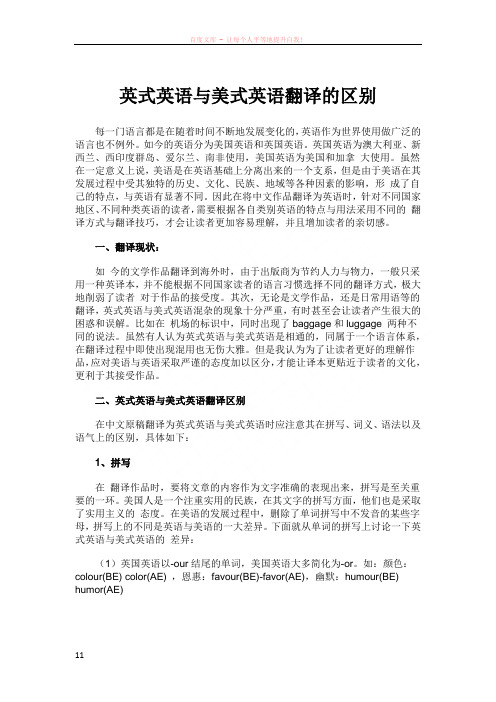
英式英语与美式英语翻译的区别每一门语言都是在随着时间不断地发展变化的,英语作为世界使用做广泛的语言也不例外。
如今的英语分为美国英语和英国英语。
英国英语为澳大利亚、新西兰、西印度群岛、爱尔兰、南非使用,美国英语为美国和加拿大使用。
虽然在一定意义上说,美语是在英语基础上分离出来的一个支系,但是由于美语在其发展过程中受其独特的历史、文化、民族、地域等各种因素的影响,形成了自己的特点,与英语有显著不同。
因此在将中文作品翻译为英语时,针对不同国家地区、不同种类英语的读者,需要根据各自类别英语的特点与用法采用不同的翻译方式与翻译技巧,才会让读者更加容易理解,并且增加读者的亲切感。
一、翻译现状:如今的文学作品翻译到海外时,由于出版商为节约人力与物力,一般只采用一种英译本,并不能根据不同国家读者的语言习惯选择不同的翻译方式,极大地削弱了读者对于作品的接受度。
其次,无论是文学作品,还是日常用语等的翻译,英式英语与美式英语混杂的现象十分严重,有时甚至会让读者产生很大的困惑和误解。
比如在机场的标识中,同时出现了baggage和luggage 两种不同的说法。
虽然有人认为英式英语与美式英语是相通的,同属于一个语言体系,在翻译过程中即使出现混用也无伤大雅。
但是我认为为了让读者更好的理解作品,应对美语与英语采取严谨的态度加以区分,才能让译本更贴近于读者的文化,更利于其接受作品。
二、英式英语与美式英语翻译区别在中文原稿翻译为英式英语与美式英语时应注意其在拼写、词义、语法以及语气上的区别,具体如下:1、拼写在翻译作品时,要将文章的内容作为文字准确的表现出来,拼写是至关重要的一环。
美国人是一个注重实用的民族,在其文字的拼写方面,他们也是采取了实用主义的态度。
在美语的发展过程中,删除了单词拼写中不发音的某些字母,拼写上的不同是英语与美语的一大差异。
下面就从单词的拼写上讨论一下英式英语与美式英语的差异:(1)英国英语以-our结尾的单词,美国英语大多简化为-or。
- 1、下载文档前请自行甄别文档内容的完整性,平台不提供额外的编辑、内容补充、找答案等附加服务。
- 2、"仅部分预览"的文档,不可在线预览部分如存在完整性等问题,可反馈申请退款(可完整预览的文档不适用该条件!)。
- 3、如文档侵犯您的权益,请联系客服反馈,我们会尽快为您处理(人工客服工作时间:9:00-18:30)。
美语听力与发音技巧 第7期(冠词“a”)
Welcome to Daily Tips on Learning English. Today’s tip is on using or omitting the English article “a” correctly.
There’s no single rule that explains how to choose whether you should use “a”, use “the” or not use any article at all. Sometimes there’s only one correct choice, and in other cases, different choices change the meaning of the sentence. Today let’s discuss the most frequently occurring differences between using the article “a” and using no article. All English nouns can be divided into 2 classes: those that are countable and those that are uncountable.
语听力与发音技巧 第5期(“h”音的略读)
Welcome to Daily Tips on Learning English. Today’s tip is on sound linking.
Remember that although written English has spaces between every word, spoken English doesn’t have pauses after every word. As a matter of fact, long strings of words are all linked together. And it is this linking, which often makes it difficult for learners of English to understand native speaker’s talking. Today’s tip is to notice how the “h” sound is often dropped in personal pronouns such as “he”, “him”, “his” and “her”. And when it is dropped, what is left is a vowel sound, and the vowel sound is always linked to the preceding word.
Notice how the use of the article “a” means that the noun it precedes is countable, and therefore you’re talking about a whole one, an entire one. If you omit the article “a”, then it means that you can’t count the noun it precedes, and therefore you are talking about a piece or a quantity or something. So remember to pay careful attention to whether nouns are being used to a countable or uncountable meaning, and be sure to use or omit the article “a” accordingly. This has been today’s daily tip. Tune in tomorrow for another tip on learning sh.
Let’s look at an example. Give her a book. Giv-er a book. Notice how the “h” is dropped and how “give her” become “giv-er”. Look at another example. Tell him to ask her. Tell-im to ask-er. Did you notice that “tell him” became “tell-im” and “ask her” became “ask-er”? This happens very frequently in spoken English, especially when “he” follows an auxiliary verb. For example, “what will he do?” becomes “What will-i do?” “Where will he go?” becomes “Where will-i go?” “When will he come?” becomes “When will-i come?” “Who will he meet?” becomes “Who will-i meet?” “How will he know?” becomes “How will-i know?” “Has he gone?” becomes “Has-i gone?” “Had he done it before?” becomes “Had-i done it before?” “Must he go?” becomes “Must-i go?” “Can he do it?” becomes “Can-i do it?” “Should he leave?” becomes “Should-I leave?” it’s important to accustom yourself to the dropped “h” sound in sound linking. This has been today’s daily tip. Tune in tomorrow for another tip on learning English.
There’re 8 pairs of consonants that differ only in the presence or lack of vocal cord vibration. Listen as I give one example of sound linking for each pair.
美语听力与发音技巧 第6期(辅音连续)
Welcome to Daily Tips on Learning English. Today’s tip is on sound linking.
When 2 identical or similar consonants are in a row, most sounds are not pronounced. For example, stop Peter. “stop” ends in the sound “p”, and “Peter” begins in the same sound. Together the words are linked as “sto-peter”. The words aren’t pronounced stop Peter. To pronounce two identical sounds one after another, would sound like someone stuttering. English words are always linked smoothly. Similar but not identical sounds such as voiced and voiceless pairs of consonants are also linked in this way. For example, it’s a big cake. “big” begins in the sound “g”, cake begins with the sound “k”. “k” and “g” differ only in that “k” is voiceless and “g” is voiced. When they are next to each other in a phrase they’re linked smoothly by not aspirating or pronouncing fully the first of the 2 sounds. Listen carefully as I read the example again. It’s a big cake. Notice how the first sound “g” is not released. If the pair of sounds is reversed, like in “I like goats.” it is the “k” sound which is not pronounced. Listen closely. I like goats. I like goats.
